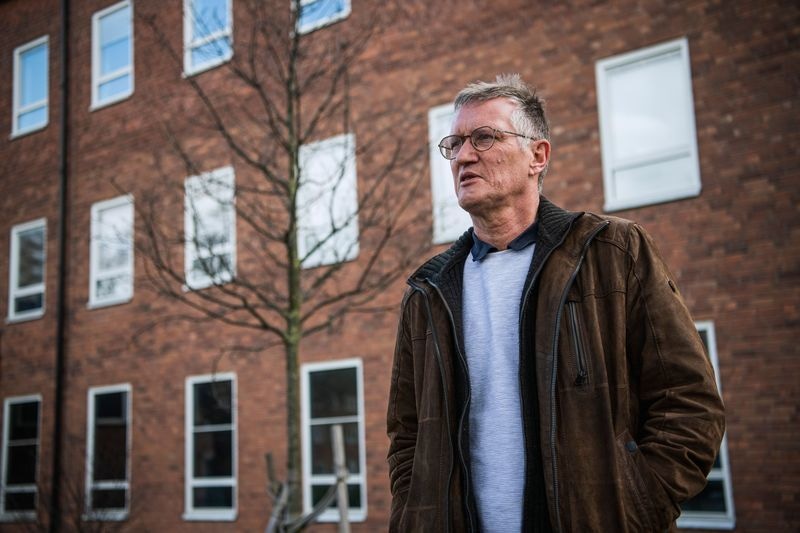As countries across the world went into lockdown, believing it to be the only established method to stop the spread of the coronavirus, Sweden announced it wouldn't impose such restrictions.
There are now 14,777 confirmed cases of Covid-19 in Sweden, a country of just over 10 million, with 1,580 deaths, according to Johns Hopkins University.
Sweden's softer approach was already an outlier in Europe as governments across the continent continued to take draconian measures to limit exposure to possible carriers of coronavirus. And as the country's fatality rate leaps ahead of its neighbours, its strategy is coming under even more scrutiny.
Among Sweden’s Nordic neighbours, Denmark closed its borders and shut its schools, as did Norway, while Finland isolated its main urban region.
Sweden has called for its citizens to take responsibility and follow social distancing guidelines along with stronger measures such as banning gatherings of more than 50 people and halting visits to retirement homes.
Yet, as part of Sweden's 'herd immunity' strategy, Swedes are able to go to restaurants, get a haircut and send their children to school even as the number of confirmed cases and deaths have mounted, above all in capital Stockholm which accounts for more than half the fatalities.
What is herd immunity?
"The aim is to try and reduce the peak, broaden the peak, not to suppress it completely. Most people would get the virus mildly, and this would build up herd immunity which, in time, would stop the disease’s progress," Sir Patrick Vallance, UK's chief scientific adviser had said last month, as he explained the logic behind the concept of herd immunity.
"The authorities and the government stupidly did not believe that the epidemic would reach Sweden at all," Bo Lundback, professor of epidemiology at the University of Gothenburg, told AFP.
Despite international attention and domestic debate, the Sweden government has maintained its course, taking its cue from its expert authority, the Public Health Agency.
Lundback and 21 other researchers urged the government to reconsider and institute "rapid and radical measures" in a joint article in Dagens Nyheter newspaper last week.
"Sweden was poorly or even not at all prepared," Lundback told AFP.
“We don’t have a choice, we have to close Stockholm right now,” Cecilia Soderberg-Naucler, Professor of Microbial Pathogenesis at the Karolinska Institute, told Reuters earlier this month.
She is one of around 2,300 academics who signed an open letter to the government at the end of March calling for tougher measures to protect the country's healthcare system.
“We must establish control over the situation, we cannot head in to a situation where we get complete chaos. No one has tried this route, so why should we test it first in Sweden, without informed consent?” she had said.
The Swedish plan
But officials and experts insist their plan is sustainable in the long-term, rejecting drastic short-term measures as too ineffective to justify their impact on society.
"I think all epidemiologists from all countries will agree that herd immunity is one thing that will eventually slow down the spread of this novel virus. Nothing else will slow it down in the long run. Either you reach it by people getting infected and getting well again or you reach it by vaccinating — but vaccines are so far off. Most countries are trying to do the same thing — we're trying to slow down the spread of coronavirus," Dr Anders Tegnell, the architect behind Sweden's relatively relaxed response to Covid-19, told Vice News.

"We, in Sweden, are using a slightly different method. That means in Sweden we're using a lot more voluntary means than other countries because that's the way we usually work," Tegnell reasoned.
In an interview to Nature, a British scientific journal, Tegnell argued that Sweden's strategy has had a "real effect", even as he cautioned that it was "too early" and "very difficult" to analyse Sweden's strategy.
"We have data showing that the flu epidemic and the winter norovirus dropped consistently this year, meaning that our social distancing and hand washing is working. And with the help of Google, we have seen that the movements of Swedes have fallen dramatically. Our 'voluntary' strategy has had a real effect," Tegnell said.
According to Reuters, however, an analysis of smartphone location data showed that while visits to public places has fallen steeply in most European countries, Sweden is bucking the trend.
Last week, health officials in the country announced 40 per cent of deaths in the Stockholm region — the epicentre of the pandemic — could be traced to retirement and care homes.
Even with measures targeting these institutions, half of the retirement homes in the capital have had cases of the virus.
One-third of the country's municipalities had reported cases in retirement homes, public radio reported in early April.
The government has had trouble explaining the outbreaks.
"We still don't quite know the reason, but there aren't too many things to choose from," Health Minister Lena Hallengren said in a Dagens Nyheter column earlier this month.
"Either the ban on visits hasn't been enforced or staff with symptoms, or that didn't think they had symptoms, have gone to work," she wrote.
According to The Guardian, Tegnell’s colleague and scientist AnnaSara Carnahan told Sveriges Radio that the number of deaths reported from old people’s homes was “probably an underestimate”, as regional health infectious diseases units were reporting that many elderly who died were not being tested.
Read more: INTERACTIVE: Track Covid-19 cases, deaths and trajectory in any country















































